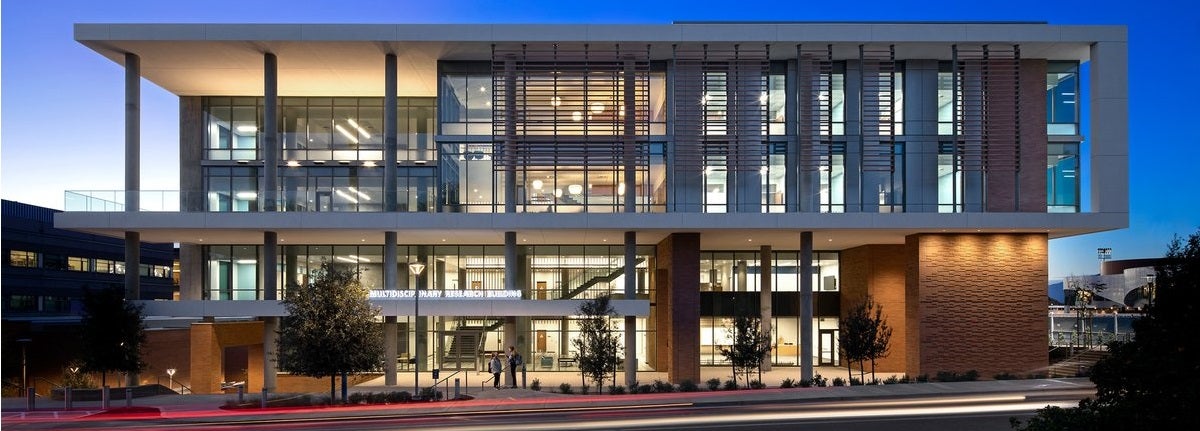Center Executive Summary:
Quantitative biological and biomedical modeling, systems biology and computational biology are rapidly becoming integral part of biomedical research. Biological problems across scales, from molecular to ecological, exhibit rich dynamics resulting from the interaction of multiple agents, ranging from ions, small molecules, proteins, membranes, cells, tissues, organs, individual organisms, populations and ecosystems. The heterogeneity and complexity of biological systems reduce the utility of techniques developed in other engineering and scientific contexts. Therefore, development and validation of novel modeling methods to study biological systems is essential.
The main long-term goal of the UCR Interdisciplinary Center for Quantitative Modeling in Biology (ICQMB) is to develop comprehensive predictive quantitative models of complex biological systems. All projects at this center will combine quantitative experiments, novel image analysis, modeling and statistical approaches, and will build upon the mutually complementary strength of the researchers at UC Riverside with support from collaborators at other institutions.
The Specific Goals of the ICQMB Are As Follows:
- Research: Quantitatively and predictively understand the complex patterns and organization that arise in living systems at space length scales from molecular to ecological and time scales from femtoseconds to years.
- Education: Prepare undergraduate, graduate and postdoctoral students for the challenges of twenty-first century biology, which require a merging of fundamental biological understanding and methods with mathematical, physical, engineering and computational approaches.
- Communication: Become a leading Center for Quantitative Modeling in Biology at the national and international level, providing opportunities to study and disseminate both novel experimental and theoretical approaches at all levels. One of our main goals is to improve communication between biological, mathematical, and physical scientists.
- Collaboration: Establish collaborations with other centers in Southern California as well as national and international centers to develop new research and educational initiatives including organization of research conferences as well as summer schools for graduate and undergraduate students.
- Software and webserver resources: to develop techniques and tools of broad utility to bioscientists and to distribute them freely to the community at large.
Last decade demonstrated the importance of interdisciplinary approaches to biomedical research in translating the significant advances of molecular genomics into better understanding of complex biological systems. Rapid development of interdisciplinary programs and Centers working on methods of Quantitative Biology in the US and other countries, along with the support provided by pioneering interdisciplinary programs at the NIH and NSF signify the importance of modeling in biomedical research. For example, NIH, ARO, DOE, FDA, NASA, NSF, and ONR have been running over the last ten years an initiative on development of Predictive Multiscale Models for Biomedical, Biological, Behavioral, Environmental and Clinical Research. The agencies recognize that an effective and comprehensive understanding of multiscale biological and behavioral systems is challenging, and it requires predictive computational models that encompass multiple biological and behavioral scales. This FOA supported the development of non-standard modeling methods and experimental approaches to facilitate multiscale modeling, and active participation in community-driven activities through the Multiscale Modeling (MSM) Consortium.
Director:
Mark Alber, Department of Mathematics, UCR (5 year term)
Steering Committee (to be rotated every three years):
Mark Alber, Department of Mathematics
Kurt Anderson, Department of Biology
Roya Zandi, Department of Physics
Dimitrios Morikis, Department of Bioengineering
Venugopala Reddy Gonehal, Department of Botany and Plant Sciences
Tamar Shinar, Department of Computer Science and Engineering
Outside Advisory Committee:
Philip Maini, FRS, Director, Wolfson Center for Mathematical Biology, Oxford University, UK
Alex Mogilner, Courant Institute and Department of Biology, New York University
Andrew D. McCulloch, Department of Bioengineering, UCSD
